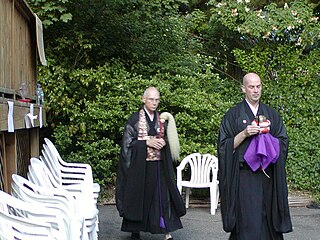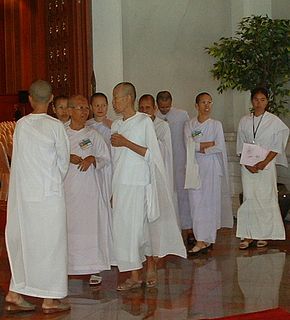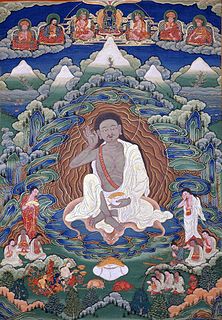 W
WIn Buddhism, an anagārika is a person who has given up most or all of their worldly possessions and responsibilities to commit full-time to Buddhist practice. It is a midway status between a bhikkhu or bhikkhuni and laypersons. An anagārika takes the Eight Precepts, and might remain in this state for life.
 W
WDiyawadana Nilame is the office of the chief lay custodian of Temple of the Tooth, Kandy, Sri Lanka. Formerly an office of the royal household, at present it is the trustee for the Temple of the Tooth as defined by the Buddhist Temporalities Ordinance of 1931. A ceremonial position, enriched with over two thousand years of history to safeguard and carry out ancient rituals for the relic of the tooth of the Buddha. The Diyawadana Nilame has the responsibility of overseeing of all aspects of the Sri Dalada Maligawa. He has the traditional duty of organizing the annual pageant, the Kandy Esala Perahera. The current Diyawadana Nilame is Pradeep Nilanga Dela.
 W
WJisha (侍者), along with the titles inji and sannō, are Japanese terms used in reference to the personal attendant of a monastery's abbot or teacher in Zen Buddhism. In the Rinzai school, the term is usually either inji or sannō. According to the book 3 Bowls: Vegetarian Recipes from an American Zen Buddhist Monastery, "While the jikijitsu is the stern father of the zendo, the jisha is the den mother, balancing the strictness that his counterpoint establishes. The jisha prepares for and greets all guests, tends to the needs of the students, takes care of the sick, and organizes the cleaning of the monastery." According to author Victor Sōgen Hori, "In the Northern Sung period, a master of a large monastery had two attendants, but by the Yüan period the number of attendants had increased to five: an incense attendant, a secretary attendant, a guest attendant, a robe attendant, and a 'hot water and medicine' attendant who cooked for him."
 W
WMaechi or Mae chee are Buddhist laywomen in Thailand who have dedicated their life to religion, vowing celibacy, living an ascetic life and taking the Eight or Ten Precepts. They occupy a position somewhere between that of an ordinary lay follower and an ordained monastic and similar to that of the sāmaṇerī.
 W
WMahasiddha is a term for someone who embodies and cultivates the "siddhi of perfection". A siddha is an individual who, through the practice of sādhanā, attains the realization of siddhis, psychic and spiritual abilities and powers.
 W
WIn Tibetan Buddhism and Bon, a Ngagpa (male), or a Ngagmo (Female) is an ordained non-monastic practitioner of Dzogchen and Tantra. The Ngagmapa are widely credited with protecting the Nyingma school and its teachings during the persecution of Buddhists in the reign of Langdarma.
 W
WA thilashin is a female renunciant in Burmese Buddhism; a Burmese Theravada Buddhist nun. They are not fully ordained nuns, as the full ordination is not legal for women in Burma, (bhikkhuni), but are closer to sāmaṇerīs "novice nuns". According to 2016 statistics published by the State Sangha Maha Nayaka Committee, there were 60,390 thilashin in Myanmar (Burma).